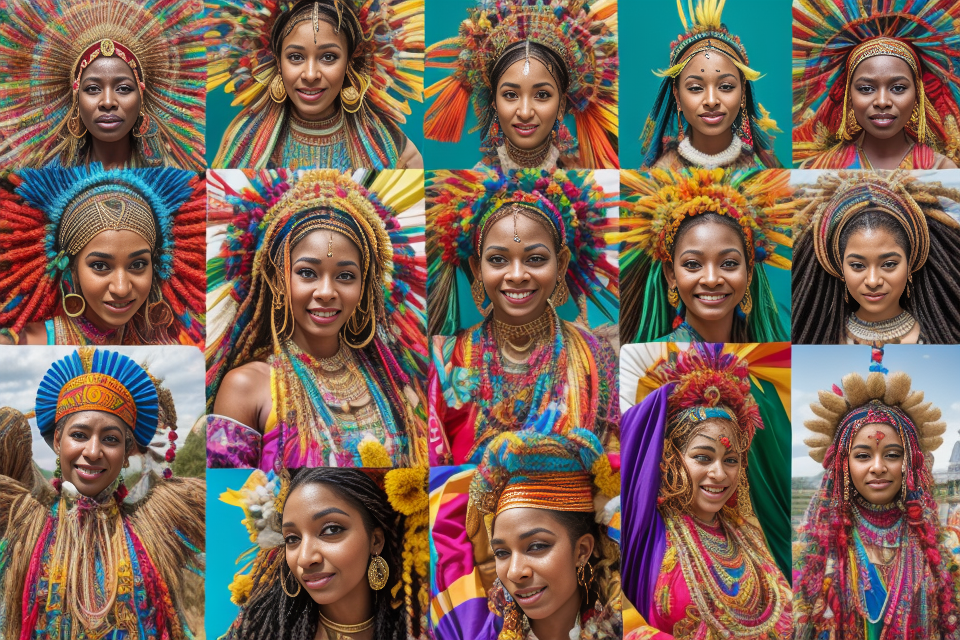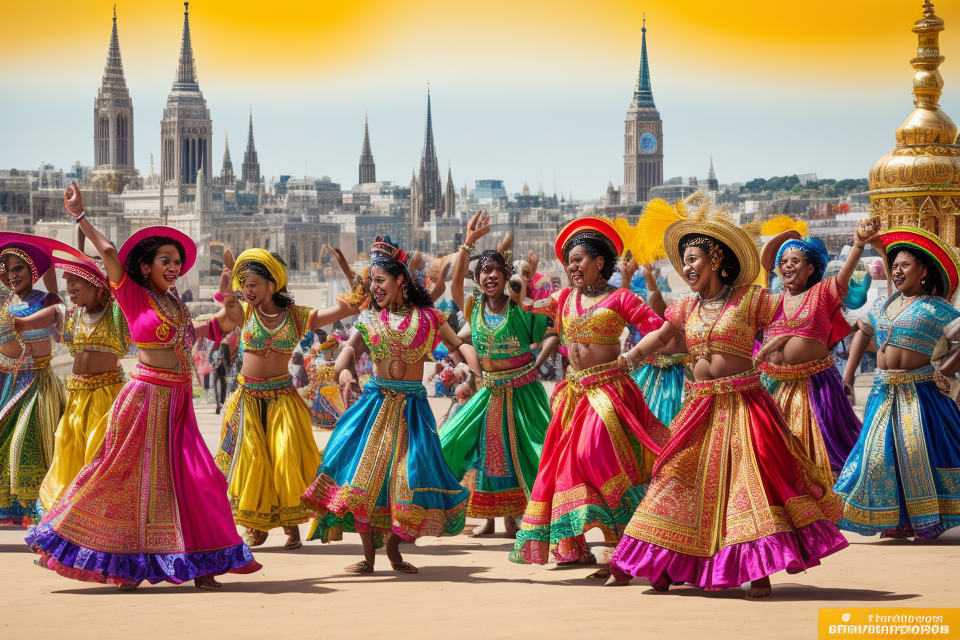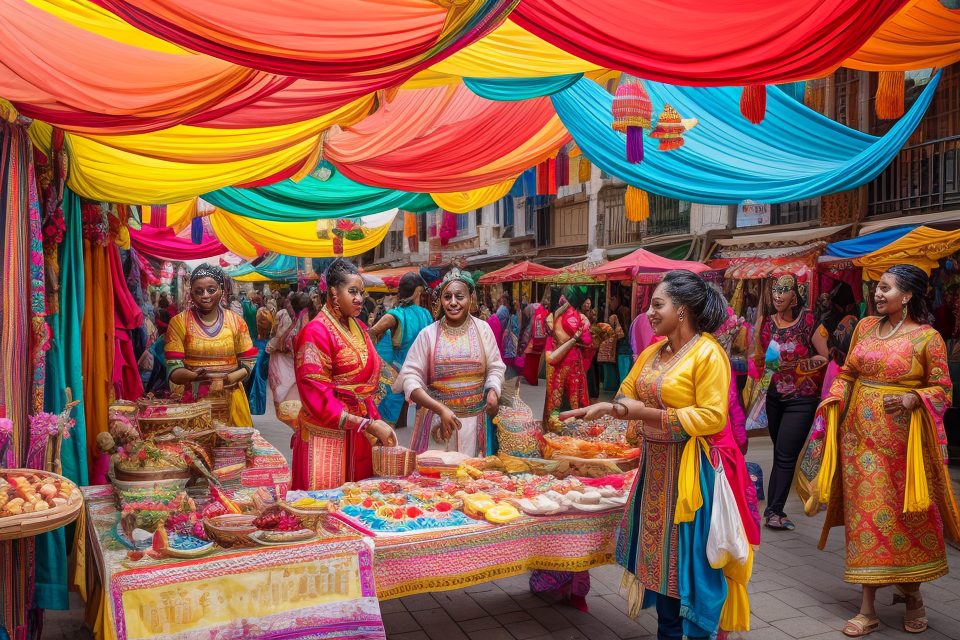Culture is the identity of a nation, the way of life, beliefs, customs, traditions, and practices that make a society unique. The world is a melting pot of different cultures, each with its own charm and beauty. The question of which country has the best culture in the world is subjective and depends on personal preferences. However, it is important to acknowledge and appreciate the richness and diversity of cultures around the world. In this article, we will explore some of the most vibrant and fascinating cultures from different countries and what makes them stand out. So, join us on this journey as we delve into the world’s cultures and discover the best in the world.
What Makes a Culture “The Best” in the World?
Defining Culture and Its Importance
Culture can be defined as the system of shared symbols, language, values, and beliefs that distinguish one group of people from another. It encompasses the ways of life, customs, and practices that are unique to a particular society.
The concept of culture is important because it shapes the way people perceive and interact with the world around them. It influences their behavior, attitudes, and values, and provides a framework for understanding the social, political, and economic structures of their society.
Furthermore, culture plays a crucial role in shaping individual and collective identities. It helps people define who they are and where they come from, and provides a sense of belonging and connection to a larger community. Additionally, culture can serve as a source of pride and unity, fostering a sense of shared history, traditions, and values among members of a particular society.
Criteria for Evaluating Cultures
Evaluating cultures to determine what makes them “the best” in the world requires a set of criteria that considers various aspects of each culture. The following criteria provide a framework for assessing cultures:
Richness and Diversity of Traditions
A culture’s richness and diversity of traditions are crucial factors in determining its worth. This criterion evaluates the depth and breadth of a culture’s customs, beliefs, and practices. A culture with a rich tapestry of traditions, showcasing its unique history and heritage, is more likely to be considered “the best.” This includes festivals, celebrations, art forms, and culinary practices that reflect the culture’s identity and distinguish it from others.
Preservation and Celebration of Cultural Heritage
The preservation and celebration of cultural heritage is another important criterion. A culture that actively preserves and celebrates its heritage, ensuring its continuity and relevance to contemporary society, is more likely to be deemed “the best.” This includes maintaining and promoting traditional practices, language, and historical landmarks, as well as integrating them into contemporary life without losing their essence.
Impact on Global Community
A culture’s impact on the global community is also a vital criterion. This considers the influence a culture has on the world at large, its contributions to humanity, and its capacity to inspire and connect people across borders. A culture that fosters unity, promotes understanding, and shares valuable knowledge and artistic expressions with the world is more likely to be considered “the best.”
Top Contenders for the Best Culture in the World
1. Japan
Cultural Richness and Diversity
Japan is a country that is renowned for its cultural richness and diversity. It is a country that has a long and complex history, which has contributed to the development of a unique and intricate culture. The Japanese culture is a blend of traditional and modern elements, which makes it one of the most fascinating and intriguing cultures in the world.
Cherry Blossoms and the Japanese Garden
Cherry blossoms are one of the most iconic symbols of Japanese culture. They are celebrated annually during the spring season, and people from all over the world come to Japan to witness the beauty of these blooming flowers. The Japanese garden is another important aspect of Japanese culture. These gardens are meticulously designed and feature elements such as rocks, water, and plants, which are arranged in a way that creates a sense of harmony and balance.
Traditional Arts and Crafts
Traditional arts and crafts play an important role in Japanese culture. These arts and crafts include activities such as pottery, woodcarving, and calligraphy. The attention to detail and the commitment to perfection that is evident in these traditional arts and crafts is a reflection of the Japanese cultural values of discipline and hard work.
Technology and Pop Culture
Japan is also known for its cutting-edge technology and pop culture. The country is home to some of the world’s most innovative and influential companies, such as Sony and Toyota. Japanese pop culture, including anime, manga, and video games, has become increasingly popular around the world, and it has had a significant impact on global culture.
Overall, Japan is a country that is rich in culture, and it offers a unique and exciting experience for anyone who is interested in exploring the world’s cultures. From its intricate history and traditions to its modern technology and pop culture, Japan has something to offer everyone.
2. India
Unity in Diversity
India is a country that is renowned for its diversity. With over 19,500 languages or dialects spoken in the country, it is no wonder that India is often referred to as a land of unity in diversity. Despite the many differences in language, religion, and culture, Indians have historically been known for their hospitality and their willingness to embrace people from all walks of life. This spirit of unity in diversity is evident in the many festivals and celebrations that take place throughout the year, bringing people together regardless of their backgrounds.
Bollywood and Indian Cinema
Indian cinema, particularly Bollywood, has a rich history and has become a significant part of Indian culture. With a vast array of movies in various languages, including Hindi, Tamil, Telugu, and Punjabi, Bollywood has gained international recognition and has become a global phenomenon. Bollywood movies are known for their elaborate song and dance numbers, and the industry has produced some of the most talented actors and actresses in the world. Indian cinema has also been instrumental in shaping Indian society and promoting social change.
Religious and Cultural Festivals
India is home to a vast array of religious and cultural festivals, many of which are celebrated with great enthusiasm and fanfare. From the colorful celebrations of Holi and Diwali to the religious observances of Ramadan and Eid, India’s festivals reflect the country’s rich cultural heritage and diversity. These festivals provide an opportunity for people to come together, share their traditions, and celebrate their unique cultures.
Indian Cuisine
Indian cuisine is renowned for its diversity and richness. From spicy curries to delicate kebabs, Indian food offers something for everyone. Each region of India has its unique culinary traditions, and dishes vary from state to state. Indian cuisine is known for its use of spices, herbs, and fresh ingredients, and many dishes are prepared using traditional cooking methods that have been passed down from generation to generation. Indian cuisine has also become popular worldwide, with many restaurants and food outlets offering a variety of Indian dishes.
3. Italy
Culinary Delights
Italy is renowned for its delectable cuisine, which offers a wide range of flavors and
4. China
Ancient Civilization and Modern Times
China boasts a rich and complex history that spans over 5,000 years. Its ancient civilization has given rise to numerous inventions, artistic and philosophical achievements, and political systems that have greatly influenced the world. From the development of the compass and paper to the invention of gunpowder, China has been at the forefront of many significant innovations. The country’s rich cultural heritage is evident in its numerous historical sites, such as the Forbidden City, the Terracotta Army, and the Great Wall of China.
Traditional Medicine and Philosophy
Traditional Chinese medicine (TCM) has been practiced for over 2,000 years and is based on the concept of Qi, or life energy, which flows through the body. TCM encompasses a range of practices, including acupuncture, herbal medicine, and martial arts. Taoism, a philosophical and spiritual system that originated in China, emphasizes living in harmony with nature and achieving a state of balance and harmony within oneself. Taoist principles have influenced Chinese culture and philosophy, and have spread to other parts of the world.
Martial Arts and Wushu
Martial arts have a long and storied history in China, with many different styles and traditions developing over the centuries. Wushu, a modern martial art that combines elements of various traditional styles, has gained popularity in recent years. Wushu emphasizes physical fitness, flexibility, and the mastery of various techniques, including kicks, strikes, and throws.
The Great Wall of China
The Great Wall of China is one of the most iconic landmarks in the world, stretching over 13,000 miles in length. Its initial construction began over 2,000 years ago to protect the Chinese Empire from invading armies. Today, the Great Wall is a popular tourist destination and a symbol of China’s rich cultural heritage. Visitors can hike along its winding path and take in breathtaking views of the surrounding landscape.
5. France
Haute Cuisine and Wine Culture
France is renowned for its exquisite cuisine, which offers a wide range of flavors and culinary experiences. From the rich and creamy sauces of classical French cuisine to the bold and vibrant flavors of Mediterranean-inspired dishes, French cuisine is known for its attention to detail, precision, and elegance. The country’s wine culture is equally impressive, with a rich history of winemaking that dates back to the Roman era. French wines are celebrated for their complexity, depth, and nuance, with regions such as Bordeaux, Champagne, and Burgundy producing some of the world’s most renowned wines.
Eiffel Tower and Other Architectural Wonders
France is home to some of the world’s most iconic architectural landmarks, including the Eiffel Tower, which has become a symbol of Paris and France. The tower’s soaring height and intricate lattice design make it a marvel of engineering and a must-see attraction for visitors to the city. In addition to the Eiffel Tower, France boasts a wealth of other architectural wonders, from the grand and opulent Palace of Versailles to the charming and picturesque villages of Provence.
Fashion and Art
France has a long and storied history of fashion and art, with Paris serving as a global center for haute couture and high fashion. French designers such as Coco Chanel, Christian Dior, and Yves Saint Laurent have all made significant contributions to the world of fashion, and the city’s runways and fashion shows are still among the most influential in the world today. In addition to its fashion industry, France is also renowned for its art, with museums such as the Louvre and the Musée d’Orsay housing some of the world’s most famous and treasured works of art.
History and Revolution
France has a rich and varied history, with a long and complex political and cultural heritage. From the reigns of the country’s kings and queens to the French Revolution and the rise of the modern state, France has played a significant role in shaping the course of history. The country’s revolutionary spirit and commitment to liberty, equality, and fraternity have had a profound impact on the world, inspiring movements for social and political change around the globe.
Overall, France is a country that is steeped in history, culture, and beauty, with a rich and diverse heritage that continues to inspire and captivate people from all over the world. Whether it’s the country’s delicious cuisine, stunning architecture, fashionable designs, or revolutionary spirit, France remains one of the world’s most important and influential cultures.
6. United States
Cultural Melting Pot
The United States is often referred to as a “melting pot” due to its diverse population. This diversity is a result of centuries of immigration, with people from all over the world coming to the US in search of a better life. The country’s culture is shaped by the unique blend of traditions, customs, and beliefs brought by these immigrants.
Hollywood and Pop Culture
The United States is known for its influential entertainment industry, particularly Hollywood. American movies, music, and television shows have a significant impact on global pop culture. From blockbuster films to chart-topping songs, American pop culture has a far-reaching influence on the world.
Innovation and Technology
The United States is a world leader in innovation and technology. American universities and research institutions produce groundbreaking research and development in fields such as medicine, engineering, and computer science. American companies are also at the forefront of technological advancements, with many of the world’s most successful and influential tech companies based in the US.
Diversity and Freedom of Expression
The United States is known for its commitment to diversity and freedom of expression. The country’s constitution protects the rights of individuals to express their opinions and beliefs, and the country has a rich history of civil rights activism. This commitment to diversity and freedom of expression has made the US a beacon of hope for people around the world seeking a better life.
Recap of Top Contenders
As we delve into the exploration of the world’s cultures, it is important to first take a moment to review the top contenders for the best culture in the world. This overview will provide a snapshot of the diverse and intricate cultures that have risen to the forefront of this global discussion.
- Japan: Known for its rich history, art, and technology, Japan has a culture that values harmony, respect, and tradition. From its ancient temples and shrines to its modern architecture and pop culture, Japan’s influence can be seen and felt across the globe.
- India: With a population of over 1.3 billion people, India is a melting pot of diverse cultures, languages, and religions. Its vibrant arts, music, and cuisine are a testament to its rich history and complex society.
- China: As the world’s most populous country, China boasts a rich and ancient culture that has influenced the world in countless ways. From its iconic landmarks like the Great Wall and the Forbidden City to its modern cities and technological advancements, China’s culture is a force to be reckoned with.
- Spain: Spain is known for its flamboyant and passionate culture, which is reflected in its music, dance, and cuisine. From the lively streets of Madrid to the picturesque landscapes of Andalusia, Spain is a country that exudes warmth and vitality.
- France: As a country that is renowned for its fashion, art, and cuisine, France has a culture that is steeped in history and sophistication. From the elegant streets of Paris to the rolling vineyards of Bordeaux, France is a country that captures the imagination of people all over the world.
- Mexico: With its vibrant music, colorful art, and delicious cuisine, Mexico is a country that is full of life and energy. Its rich history and diverse cultures are reflected in its ancient ruins, colonial cities, and modern metropolises.
These are just a few of the many cultures that make up the diverse tapestry of human experience. As we continue our exploration of the world’s cultures, we will delve deeper into each of these contenders and uncover the unique qualities that make them stand out.
Personal Reflections on Cultural Experiences
Exploring different cultures can be a life-changing experience. It allows us to broaden our perspectives, challenge our assumptions, and appreciate the diversity of human experience. Here are some personal reflections on cultural experiences:
Learning from Other Cultures
Traveling to different countries and immersing oneself in a foreign culture can be a great way to learn about the world and oneself. For example, while living in Japan, I learned about the importance of punctuality, respect for elders, and the value of teamwork in Japanese culture. I also discovered new foods, such as sushi and tempura, and tried new activities, such as martial arts and calligraphy. These experiences taught me to be more open-minded, adaptable, and respectful of other cultures.
Appreciating the Differences
Cultural exchange also provides an opportunity to appreciate the differences between cultures. For instance, while studying in Spain, I was fascinated by the Spanish siesta tradition, which allowed people to take a break from work during the hottest part of the day. I also appreciated the emphasis on family and community in Spanish culture, which contrasted with the individualistic culture of the United States. These experiences taught me to embrace diversity and to see the world from different perspectives.
Embracing the Global Community
Finally, cultural exchange can foster a sense of global community. Meeting people from different cultures and sharing experiences can help to break down barriers and promote understanding and cooperation. For example, while volunteering in Thailand, I worked with local people to build schools and provide education to children in rural areas. This experience taught me the importance of working together to create positive change in the world.
Overall, cultural exchange is a valuable and enriching experience that can broaden our horizons and teach us about the world and ourselves. By learning from other cultures, appreciating the differences, and embracing the global community, we can become more empathetic, open-minded, and globally aware individuals.
FAQs
1. What is culture?
Culture refers to the beliefs, customs, and practices that are unique to a particular group of people. It encompasses a wide range of elements, including language, religion, art, music, literature, and social norms.
2. Why is it important to explore different cultures?
Exploring different cultures allows us to broaden our perspectives and gain a deeper understanding of the world around us. It helps us appreciate the diversity of human experience and develop empathy and respect for people from different backgrounds. Additionally, it can also provide valuable insights into history, art, literature, and other fields.
3. Which country has the best culture in the world?
It is subjective to determine which country has the best culture in the world, as cultural preferences and values are highly personal and vary from person to person. Some people may appreciate the rich history and art of Italy, while others may be drawn to the vibrant and dynamic culture of Japan. Ultimately, the best culture in the world is a matter of personal opinion.
4. How can I explore different cultures?
There are many ways to explore different cultures, including traveling to different countries, attending cultural events and festivals, reading books and watching films from different countries, and learning a new language. Additionally, engaging with people from different backgrounds and participating in cultural exchange programs can also provide valuable insights into different cultures.
5. What are some of the most culturally rich countries in the world?
There are many countries around the world that are known for their rich and diverse cultures. Some examples include Japan, Italy, China, India, and Mexico. Each of these countries has a unique and distinct culture that is shaped by its history, geography, and people.



